
Apr 14, 2022 | From the martyrs
Claret and Balmes! It was not just the whim of a few writers that brought these two illustrious names together. It was the providential hand of God that, by forming with these two red tongues of fire a single flame, a flame of light and a flame of life, illuminated the dark and difficult paths of the Spanish nation in the last century.
The year 1840 arrived and the two defenders of the Catholic cause entered the battlefield at almost the same time. In April, Balmes published his first book in defence of the Catholic clergy. In August of the same year, Father Claret began his famous series of missions, which worked wonders in innumerable villages throughout Spain.
It is truly wonderful to contemplate the life of the Sallentine apostle, so virtuous, so fruitful, illuminated many times by the splendour of miracles, and always crowned by the splendour of holiness. But who can forget the treasure of science that is the multitude of his principles, the abundance of knowledge that his incessant preaching demanded, full of luminous ideas and always based on Sacred Scripture and the writings of the Holy Fathers and Doctors of the Church.
Balmes’ literary output was large, sufficient to form a library. But this eminent wisdom and prodigious fecundity, supported always by a perfect submission to the authority of the Church and a humble devotion to the Rosary, gave to the spirit of the Catalan philosopher that constant elevation, sincerity and purity which in the Sallentine apostle was shining with flashes of eminent holiness.
Both athletes took to the field, using the same weapons of combat, for both had moulded their minds in the same way. Thus, the saintly Archbishop Claret wrote in his Plan of Studies for the Seminary of L’Escorial: “Whatever author is explained in the classrooms, if you want to know theology, always keep before your eyes the Summa of St Thomas”. And Balmes said: “In the Summa of St Thomas one finds everything: Philosophy, Religion, Law, everything is, as in a cocoon, in those laconic sentences that contain within themselves unimaginable riches of science”.
And why not say so? Close spirits also showed us Claret and Balmes, when the hand of tribulation and calumny was knocking at their doors. When the good intentions of the author of “Pius IX” were misinterpreted, the humble philosopher replied to a friend who urged him to defend himself: “Truth, virtue, conscience, God, it is precisely this that we must look at; the rest will soon pass. And when the hour of probation came for the confessor of Isabella II and the holy archbishop of Cuba, and when he was calumniated and defamed in newspapers, magazines and brochures, as perhaps no other saint had ever been, he consumed in the silence of his heart the bitter bread of calumny and defamation; and with his heart turned to God and his face serene, he marched resolutely into exile.
Claret and Balmes! Here are two like-spirits, two fraternal hearts, two ideas that sprang at the same time from the will of God. They were the ‘two solid gold cherubim whose wings covered the Mercy seat of the Spanish Church in the 19th century’. Honour to their illustrious names!
José Brengaret Pujol


Apr 10, 2022 | Noticeboard
Christ is risen
and with Him our hope has risen
(Pope John Paul II)
Christ is risen! And we have the opportunity to open ourselves and receive his gift of hope. Let us open ourselves to hope and set out on our journey; may the memory of his works and words be a shining light, directing our steps in trust, towards that Easter which will have no end.
May the joy of the resurrection free us from loneliness, weakness, and fear towards strength, peace, and happiness.
P. Krzysztof Gierat CMF
General Postulation
of the Claretian Missionaries
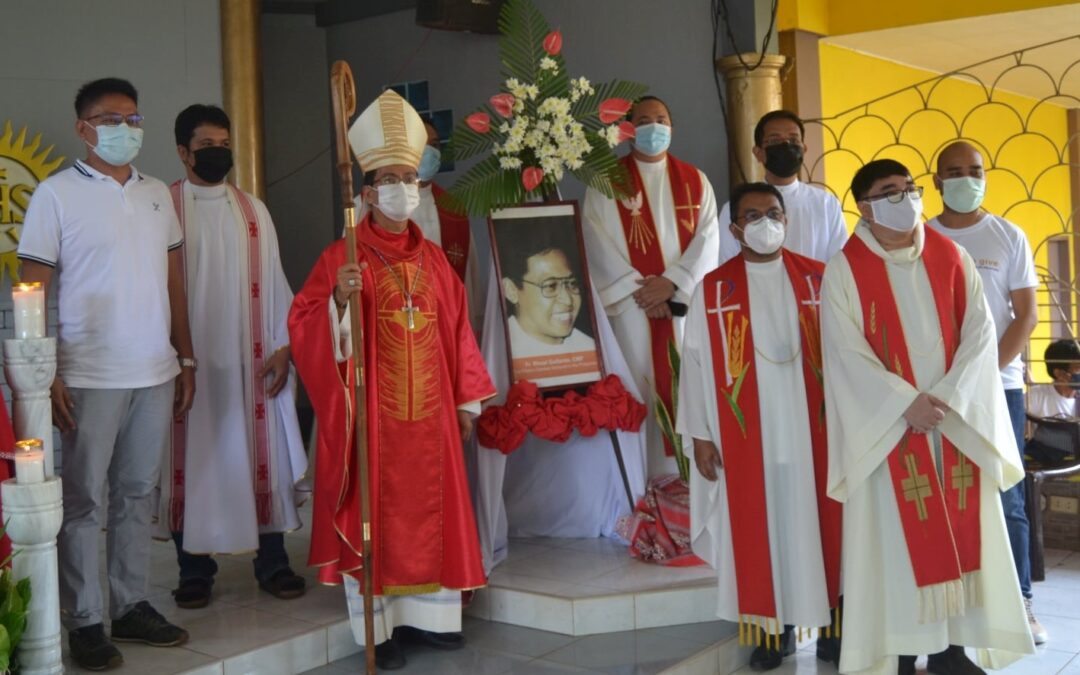
Jun 3, 2021 | Noticeboard
The Claretian Missionaries of the Philippine Province, as it celebrates its 75th year of Claretian presence in the Philippines, has begun preparing the documentation for the initiation of the process of beatification due to the martyrdom of Father Rhoel Gallardo. He was a Claretian priest kidnapped by the Muslim extremist group Abu Sayyaf and murdered on May 3, 2000, on the island of Basilan.
On May 3, 2021, Msgr. Leo Dalmao, CMF, prelate of the Territorial Prelature of Isabela, celebrated the Eucharist for the twenty-first death anniversary of Father Rhoel and the start of these preparations. It took place at the San Vicente Ferrer Parish church in Tumahubong, the village where the priest carried out his ministry, praying for peace.
For the Claretians, Tumahubong is tantamount to Gallardo and to many others who also shed their blood for their faith and principles. It is the promised land, the testing ground of arduous hearts for the mission, the love of those who see Jesus amidst religious and political conflicts.
On May 3, 2000, Fr. Gallardo died in a crossfire between the Abu Sayyaf group holding him hostage and the security forces trying to rescue those kidnapped. The priest, the school principal, four teachers, and students from the Claret School of Tumahubong were held in captivity from March 20. He was found with three gunshot wounds at close range to his head, shoulder, and back, and the nails of his index finger and toes had been pulled out. The bandits also killed three teachers and five children.
Basilan is a known stronghold of the Abu Sayyaf, notorious for kidnapping for ransom and other atrocities. The month and a half-long hostage crisis were also days of heroism for the 34-year-old missionary.
Witnesses said he would always look for the female teachers when they were separated from other captives. His concern irked the bandits, who punched and kicked him until he was severely bruised. Those who survived also recalled how Gallardo asked them not to lose hope and pray the rosary. They would do so discretely as their captors prohibited them from praying, even forcing them to denounce Christianity.

Father Rhoel Gallardo was born in Olongapo City, north of Manila, on 29 November 1965. Gallardo had a first taste of missionary life during his novitiate in Zamboanga City’s town of Bunguiao. He made his first religious profession in 1989 in Isabela and completed his pastoral year in Maluso town, also in Basilan. In his application for the perpetual profession, he wrote: “My pastoral immersion in Basilan last year made me experience concretely our witnessing and evangelizing life and mission to the poor (as well as) our Community’s presence in the dialogue of life and faith with our Muslim brothers and sisters”. “These experiences, as a whole, have become a real challenge to me to be a committed missionary and active witness to God’s liberating love for humanity… conscious that our life and mission demand a total giving of ourselves for the greater glory of God and the salvation of humankind”, he added.
Gallardo made his perpetual profession in 1993 and was ordained to the priesthood at the Immaculate Heart of Mary Parish in Quezon City in 1994. A few years after his ordination, he had volunteered to go to Tumahubong, a village in the Town of Sumisip, Basilan Province, where he served as the Claret School director and parish priest of San Vicente Ferrer Parish.
Father Gallardo was the first priest kidnapped in Basilan to be killed. Other priests and nuns had been seized, even beaten, but in the end, everyone was freed. People already think of him as a martyr, a hero. The other hostages said that he did not want to give up the cross and the rosary, as the Islamists wanted. That’s why they tortured him by ripping off his nails. He suffered a lot; yet, as school director even in captivity, he cared first of all about the teachers and the children entrusted to him. He offered his life for the people around him.
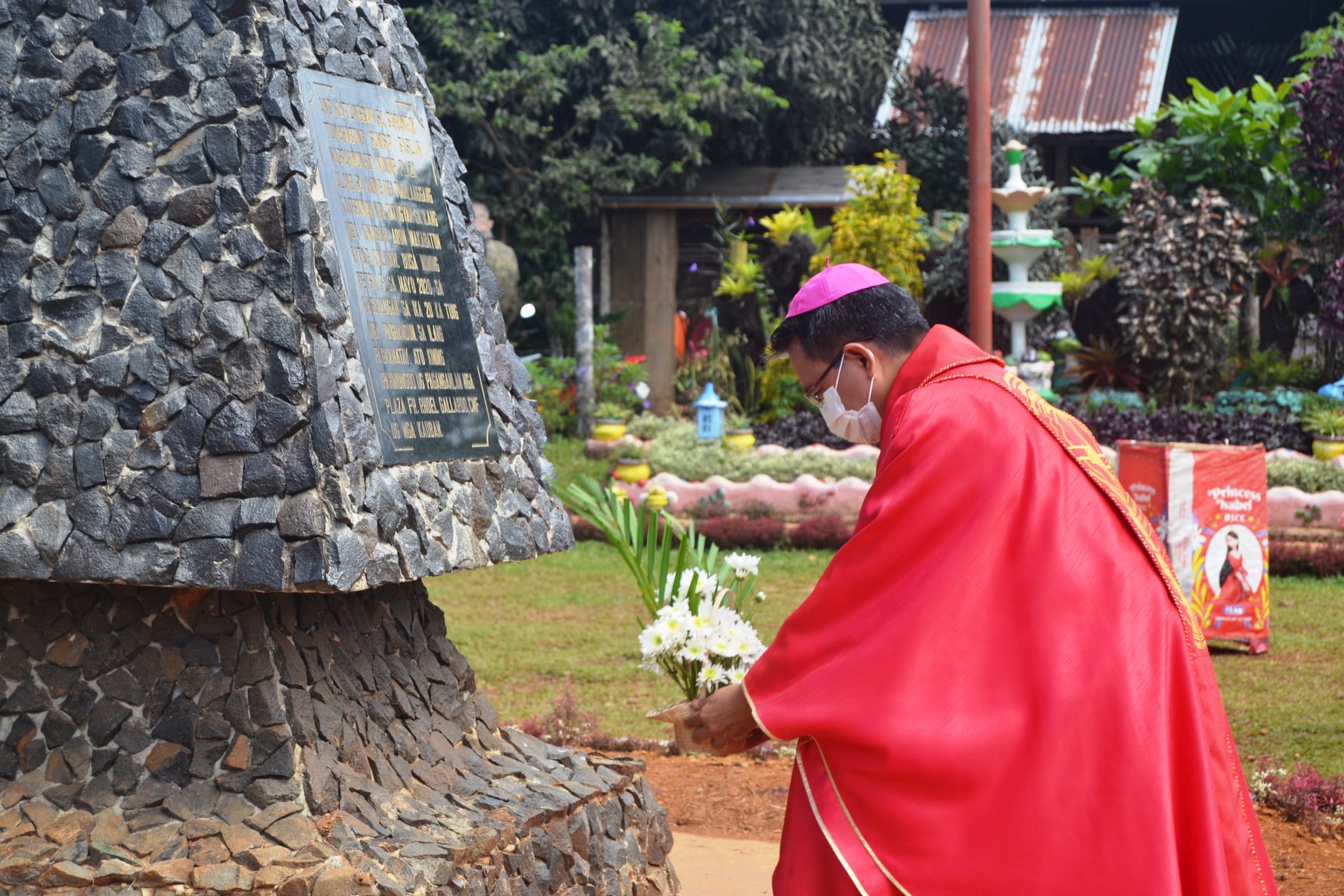

Jun 3, 2021 | From the martyrs
Nobody is unconscious of the abnormal state of Spain in the last century; the wars and internal revolutions, the frequent changes of government. In this critical period, the Venerable Father Claret appeared in the palace of the history of the country, to carry out one of the most important functions, that of Confessor to the Queen.
Although it was so easy in the palace to become entangled in matters outside his ministry, he was always completely separated from politics, as those who knew him closely assure us, and he himself affirms it when he writes: “I have never wanted to get involved in political matters” (Autobiography, part III, chap. 12). It is not to be believed that this is why the Venerable forgot to intimate to Elizabeth II her duties as Queen, as Fr. Aguilar notes in the “Vida admirable del Siervo de Dios” (Life of the Servant of God).
In purely political matters he behaved with the greatest circumspection. So says the Most Rev. Archbishop of Granada, Don Bienvenido Monzón in a letter dated 14 January 1880 with these words: “I believe that Mr. Claret, in his circumstances, knew how to reconcile the simplicity of the dove with the necessary cunning of the serpent, so as never to become entangled, nor allow himself to be bound up in the secret palace plots, nor in the intrigues and heated struggles of the political parties that were vying for power and taking the reins of government out of his hands, in order to conserve intact and inviolable the holy liberty and independence of his sacred ministry”.
That this is the genuine spirit of the Venerable is confirmed by the rule he prescribed for his Missionary Sons. It reads: “They should abstain from politics except for the sake of religion and obey the dispositions of the civil authorities as long as they do not oppose divine or ecclesiastical laws” (Constitutions, part II, ch. 16).
And he complied with it practically, by signing the Queen’s recognition of Italy, separating himself from her side; and not returning to court until he was ordered to do so by Pius IX himself.
Conduct worthy of imitation in all times and which should be the norm for the Spanish clergy.
Sebastián Riera, C.M.F.
– Taken from “Martyrs Honoring the Father Founder” (Cervera 1934).
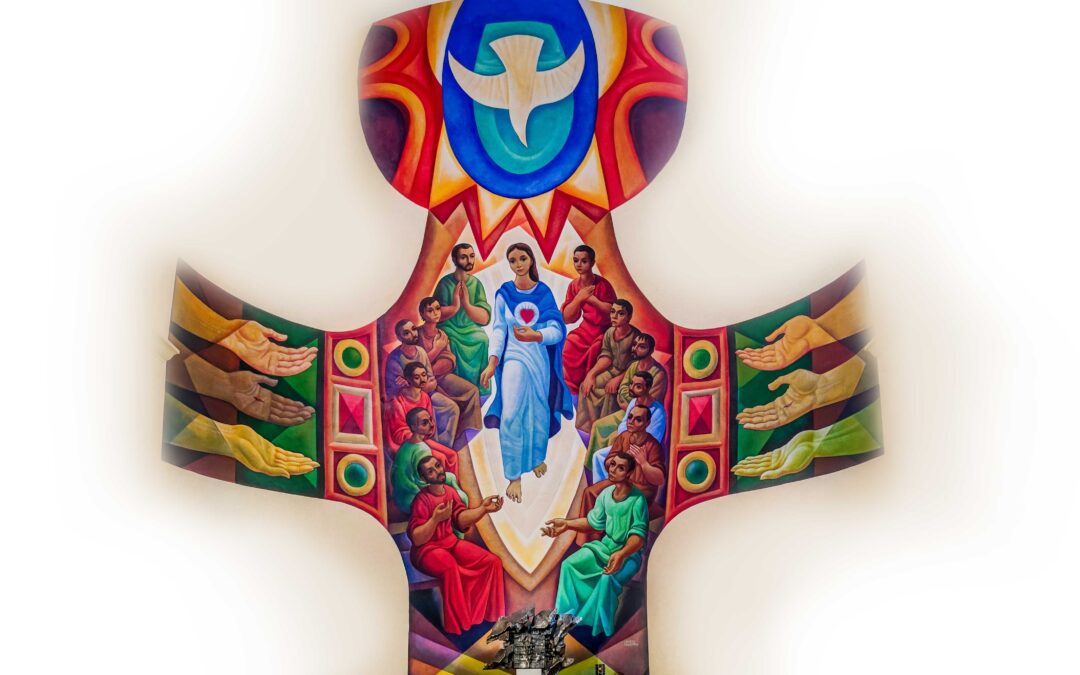
Apr 12, 2021 | Noticeboard
Pope Francis, The General Audience, 07.04.2021
When we pray, we never do it alone: even if we do not think about it, we are immersed in a majestic river of invocations that precedes us and continues after us.
In the prayers we find in the Bible, and which are often echoed in the liturgy, there is a trace of ancient stories, of prodigious liberations, of deportations and sad exiles, of emotional returns, of praises that flow before the wonders of creation… And so these voices are handed down from generation to generation, in a continuous interweaving between personal experience and that of the people and humanity to which we belong. No one can detach himself from his own history, from the history of his people, and we always carry this heritage in our habits and also in our prayer. In the prayer of praise, especially in that which blossoms in the hearts of the little ones and the humble, there is an echo of the song of the Magnificat which Mary raised to God before her kinswoman Elizabeth; or of the exclamation of old Simeon who, taking the Child Jesus in his arms, said: “Now you may let your servant go in peace, O Lord, according to your word” (Lk 2:29).
Prayers – the good ones – are “diffusive”, they propagate continuously, with or without messages on “social networks”: from hospital wards, from moments of festive gathering as well as from those in which one suffers in silence… The pain of each person is the pain of all, and the happiness of some is transferred into the soul of others. Pain and happiness are part of the same story: they are stories that make history in one’s own life. You relive the story in your own words, but the experience is the same.
Prayers are always reborn: every time we join hands and open our hearts to God, we find ourselves in a company of anonymous saints and recognised saints who pray with us, and who intercede for us, as elder brothers and sisters who have passed through the same human adventure as us. In the Church there is no mourning that remains solitary, no tear that is shed in oblivion, because everything breathes and shares in a common grace. It is no coincidence that in the ancient churches the burials were in the garden around the sacred building, as if to say that in some way the host of those who have gone before us participates in every Eucharist. There are our parents and grandparents, there are the godparents, there are the catechists and other educators… That faith which has been handed down, transmitted, which we have received: with the faith has also been transmitted the way of praying, prayer.
The saints are still here, not far from us; and their representations in the churches evoke that “cloud of witnesses” that always surrounds us (cf. Heb 12:1). At the beginning we heard the reading from the Letter to the Hebrews. They are witnesses whom we do not worship – of course, we do not worship these saints – but whom we venerate and who in a thousand different ways refer us to Jesus Christ, the one Lord and Mediator between God and man. A saint who does not remind you of Jesus Christ is not a saint, not even a Christian. A saint reminds you of Jesus Christ because he has walked the path of life as a Christian. The saints remind us that even in our lives, though weak and marked by sin, holiness can blossom. In the Gospels we read that the first ‘canonised’ saint was a thief and ‘canonised’ not by a Pope, but by Jesus himself. Holiness is a life journey, an encounter with Jesus, whether long or short, whether in an instant, but always a testimony. A saint is the testimony of a man or woman who has met Jesus and followed Jesus. It is never too late to convert to the Lord, who is good and great in love (cf. Ps 102:8).
The Catechism explains that the saints “contemplate God, praise him and do not cease to care for those they have left on earth. […] Their intercession is the highest service they render to God’s plan. We can and must ask them to intercede for us and for the whole world” (CCC, 2683). In Christ there is a mysterious solidarity between those who have passed on to the next life and us pilgrims in this one: our deceased loved ones continue to care for us from heaven. They pray for us and we pray for them, and we pray with them.
This bond of prayer between us and the saints, that is, between us and the people who have come to the fullness of life, this bond of prayer we already experience here, in earthly life: we pray for each other, we ask and offer prayers… The first way to pray for someone is to talk to God about him or her. If we do this frequently, every day, our heart does not close, it remains open to our brothers and sisters. Praying for others is the first way of loving them and leads us to concrete closeness. Even in times of conflict, one way to dissolve the conflict, to soften it, is to pray for the person with whom I am in conflict. And something changes with prayer. The first thing that changes is my heart, my attitude. The Lord changes it to make an encounter possible, a new encounter, and to prevent the conflict from becoming a war without end.
The first way to deal with a time of anguish is to ask the brothers, the saints above all, to pray for us. The name given to us in Baptism is not a label or a decoration! It is usually the name of the Virgin, a saint or a saint, who are waiting to “give us a hand” in life, to give us a hand to obtain from God the graces we need most. If in our lives the trials have not reached their climax, if we are still capable of perseverance, if despite everything we go on with confidence, perhaps we owe all this more to the intercession of so many saints than to our own merits, some in Heaven, others pilgrims like us on earth, who have protected and accompanied us because we all know that here on earth there are holy people, holy men and women who live in holiness. They don’t know it, we don’t know it either, but there are saints, everyday saints, hidden saints or, as I like to say, the “saints next door”, those who live with us in life, who work with us, and lead a life of holiness.
Blessed therefore be Jesus Christ, the only Saviour of the world, together with this immense flowering of saints who populate the earth and who have made their lives a praise to God. For, as St Basil stated, “for the Spirit the saint is a particularly suitable dwelling place, since he offers himself to dwell with God and is called his temple” (Liber de Spiritu Sancto, 26, 62: PG 32, 184A; cf. CCC, 2684).








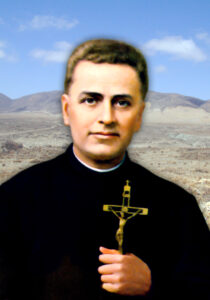
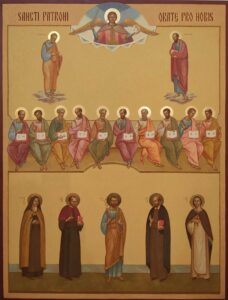
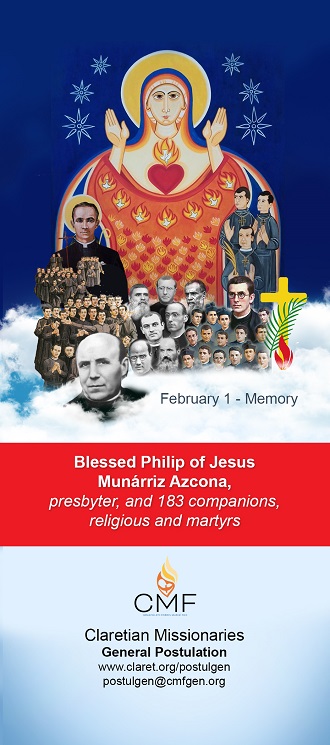
You must be logged in to post a comment.